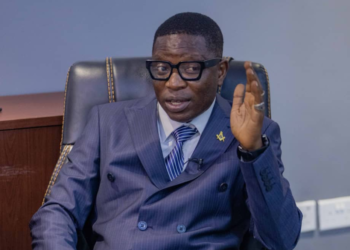In a session of Parliament today, the Minister of Energy, Dr. Matthew Opoku Prempeh, addressed concerns regarding the ongoing power outages affecting various parts of Ghana.
Contrary to widespread public belief, Dr. Prempeh categorically denied that the Electricity Company of Ghana (ECG) is engaged in load-shedding, instead attributing the power disruptions to a range of technical issues and unforeseen challenges.
Responding to questions on the floor of Parliament, Dr. Opoku Prempeh acknowledged the persistent, irregular, and unpredictable nature of the outages but emphasized that these incidents do not equate to load-shedding. He detailed several contributing factors, primarily focusing on the overload of transformers and the increasing demand for electricity in rapidly developing areas.
“The question was asked over two months ago…, ECG is not undertaking load-shedding as at the time the question was asked.”
Dr. Matthew Opoku Prempeh, Minister of Energy
Dr. Opoku Prempeh explained that the power disruptions are often localized, stemming from the sudden surge in electricity consumption in specific areas. He pointed to parts of East Legon, which have transitioned from purely residential zones to bustling business districts, significantly increasing power demand and overloading existing infrastructure.
“There are certain areas in this country where all of a sudden, the number of residents and businesses have accumulated, parts of East Legon which was purely a residential area have now become a business district, increasing power consumption.”
“This hampers the existing lines there, so the transformers and lines had to be updated, causing outages due to the average capacity of overloaded lines and transformers.”
Dr. Matthew Opoku Prempeh, Minister of Energy
Further elucidating the reasons behind the power outages, Dr. Opoku Prempeh cited several technical difficulties and maintenance operations that have exacerbated the situation. He mentioned an emergency incident involving CenPower, which led to a complete shutdown and the immediate loss of 40 megawatts of power.
“At the time the questionnaire put the question, CenPower had an emergency which meant a complete shutdown, losing immediately 40 megawatts. That also contributed, and the plant maintenance on Amandi power was also ongoing at the same time,” Dr. Opoku Prempeh explained.
Additionally, Dr. Opoku Prempeh highlighted the impact of maintenance activities and emergency outages requested by GRIDCo, the Ghana Grid Company Limited. These unplanned incidents further strained the power supply, leading to the perception of load-shedding among consumers.
Commitment to Resolving Issues

Despite the challenges, Dr. Opoku Prempeh assured Parliament and the public that measures are being taken to address the technical issues and improve the stability of the power supply. He emphasized that the current situation does not signal a return to the severe power rationing, commonly known as ‘dumsor,’ experienced in the past.
“The issues we are facing now are being addressed, and we are committed to ensuring a stable and reliable power supply for all consumers,” Dr. Opoku Prempeh affirmed.
The Minister’s statements come at a time when frustration among consumers is high due to the frequent power outages. Many Ghanaians have expressed concerns over the economic impact of the unreliable power supply, particularly on small businesses and residential areas.
As efforts to upgrade infrastructure and resolve technical issues continue, the government faces the challenge of restoring public confidence in the reliability of the national power grid. Dr. Prempeh’s clarifications provide some insight into the complexities of the current power supply challenges and the ongoing efforts to mitigate them.
Moving forward, continuous communication and transparency from the Ministry of Energy and ECG will be crucial in managing public expectations and maintaining trust. The government’s commitment to addressing the root causes of the outages and preventing a recurrence of severe power rationing is essential for ensuring a stable energy future for Ghana.
READ ALSO: UK Inflation Hits Target for First Time in Three Years





















